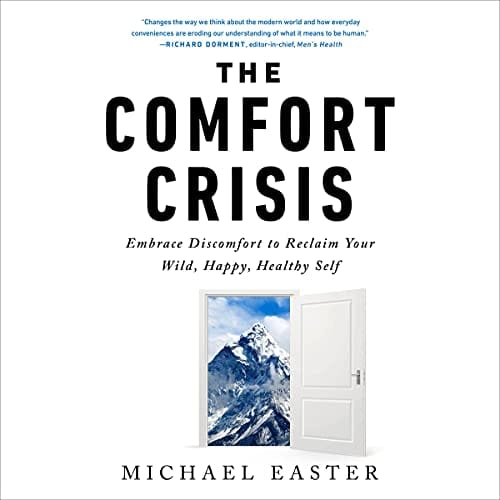The 20-5-3 Rule: Nature's Prescription for a Happier, Healthier You
Uncover the transformative power of nature with the 20-5-3 rule from "The Comfort Crisis" by Michael Easter. Embrace discomfort to rediscover joy, resilience, and a deep connection to the world around us.

In "The Comfort Crisis," author Michael Easter embarks on a transformative journey that challenges our modern comforts and sedentary lifestyle, urging us to embrace discomfort to uncover a more vibrant, fulfilled existence. With compelling storytelling, Easter shares his adventures from the remote wilderness of Alaska to the bustling streets of Bhutan, exploring how various cultures and experiences shape our well-being. His message is clear: stepping out of our comfort zone is not just beneficial; it's necessary for our happiness and health.
One of the book's most impactful revelations is the 20-5-3 rule, a simple yet profound guideline for integrating nature into our lives to enhance our mental and physical health. Easter's exploration of discomfort extends beyond physical endurance, touching on the importance of solitude, fasting, and even cold exposure, each presenting a path to rediscovery and resilience.
"The Comfort Crisis" is more than just a call to action; it's a deeply personal narrative that resonates with anyone feeling stuck in the monotony of modern life. Easter's insights are a compelling reminder that, in our quest for convenience, we may be missing out on the very experiences that make life worth living.

The Comfort Crisis: Embrace Discomfort to Reclaim Your Wild, Happy, Healthy Self
In many ways, we’re more comfortable than ever before. But could our sheltered, temperature-controlled, overfed, underchallenged lives actually be the leading cause of many our most urgent physical and mental health issues? In this gripping investigation, award-winning journalist Michael Easter seeks out off-the-grid visionaries, disruptive genius researchers, and mind-body conditioning trailblazers who are unlocking the life-enhancing secrets of a counterintuitive solution: discomfort.
Exploring the 20-5-3 Rule: A Gateway to Nature's Healing Power
In a world where the digital leash pulls tighter every day, Michael Easter's "The Comfort Crisis" offers a lifeline back to the natural world with the elegantly simple 20-5-3 rule. This guideline serves as a beacon for those yearning to reconnect with nature, promising a wealth of mental, emotional, and physical benefits.
Weekly Refresh: Just 20 minutes in a green sanctuary, thrice a week, can act as a balm for our frazzled minds and bodies. These moments amidst trees, birds, and fresh air are not merely escapes but vital engagements with the world that ground and rejuvenate us. Whether it's a tranquil park bench or a vibrant garden path, these brief respites from urban chaos can lower stress, enhance focus, and uplift our spirits.
Monthly Recharge: Elevating our connection, five hours in semi-wild landscapes each month invites us into a deeper communion with nature's unbridled beauty. This commitment carves out space for reflection and awe, reinforcing our bond with the earth and ourselves. It's an opportunity to wander through forests, saunter along seashores, or meander by mountain streams, cultivating a sense of peace and belonging that only nature can offer.
Yearly Reset: The pinnacle of Easter's pyramid, three days unplugged and off-grid annually, promises a profound reset for our cluttered minds. This immersive retreat into nature's embrace is a chance to silence the constant buzz of life, allowing our creativity and clarity to flourish anew. Whether through a solitary hike, a quiet cabin stay, or a tent under the stars, this annual pilgrimage to the wild serves as a crucial recalibration, reminding us of our innate resilience and interconnectedness with the world.
As a kid in scouts I would go camping for the weekend just about every month and would head out for a week-long or longer backpacking trip at least once a year. I continued a lot of that in college with even longer excursions in the summer living amongst Colorado's fourteeners. Nowadays with two young kids, a full time job and a house to update, outdoors time is more limited. I get out on my bike for 60-90 minutes a few times a week, but I'm not fulfilling those longer outdoor excursions. "The Comfort Crisis" was an important reminder that disconnecting and getting out there is an important part of life and something I want to pass on to my children. By embracing discomfort and prioritizing our relationship with the natural world, we can rediscover the joy, wonder, and health that come from being truly, deeply connected to the earth.





